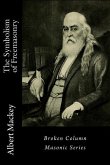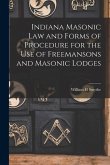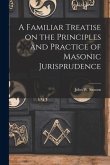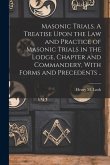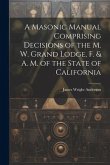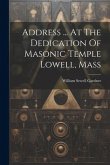Anyone who is interested in Masonic law, how lodges and grand lodges are run, and how Masons should act in Lodge and society should buy this book. This is a great outline for the government of all lodges, including dealing with Masonic offenses and different levels of punishment for such offenses. From the Introduction: The laws which govern the institution of Freemasonry are of two kinds, unwritten and written, and may in a manner be compared with the "lex non scripta," or common law, and the "lex seripta," or statute law of English and American jurists. The "lex non scripta," or unwritten law of Freemasonry is derived from the traditions, usages and customs of the fraternity as they have existed from the remotest antiquity, and as they are universally admitted by the general consent of the members of the Order. In fact, we may apply to these unwritten laws of Masonry the definition given by Blackstone of the "leges non scriptæ" of the English constitution-that "their original institution and authority are not set down in writing, as acts of parliament are, but they receive their binding power, and the force of laws, by long and immemorial usage and by their universal reception throughout the kingdom." The "lex scripta," or written law of Masonry, is derived from a variety of sources, and was framed at different periods. Many documents are of sufficient authority to substantiate any principle, or to determine any disputed question in masonic law, and are discussed in this book.
Hinweis: Dieser Artikel kann nur an eine deutsche Lieferadresse ausgeliefert werden.
Hinweis: Dieser Artikel kann nur an eine deutsche Lieferadresse ausgeliefert werden.


